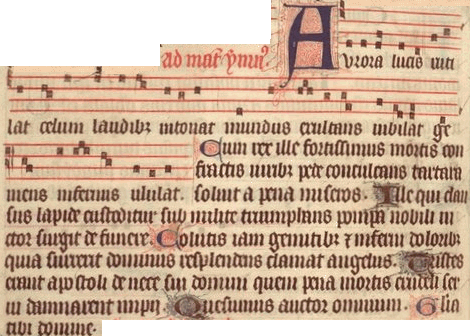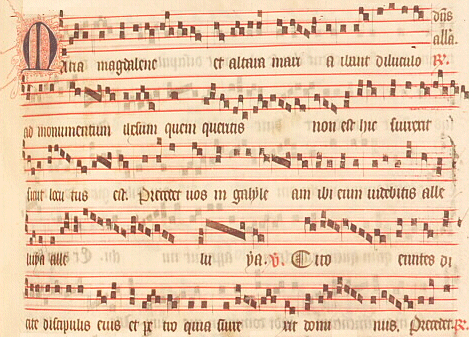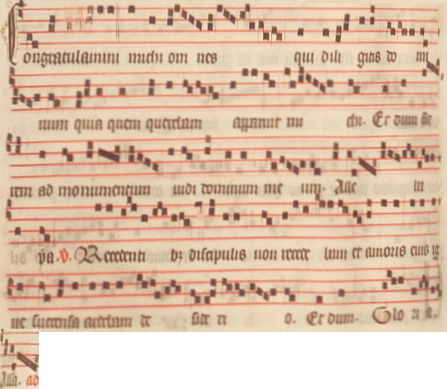Even Years: Eusebius of Caesaria, The solemnity of Easter, 4-5 (PG 24, 698-699)
| Τοιαῦτα
τὰ καινὰ μαθήματα
πάλαι μὲν διὰ
συμβόλων ἐπεσκιασμένα,
νεωστὶ δὲ εἰς φῶς
ἀνακεκαλυμμένα.
Καὶ δὴ καὶ ἡμεῖς
τὸ κεφάλαιον τῆς
ἑορτῆς κύκλων
περιόδοις καθ' ἕκαστον
ἔτος ἀναζωπυροῦμεν,
προέορτα μὲν
προπαρασκευῆς
ἕνεκα τὴν
τεσσαρακονθήμερον
ἄσκησιν
παραλαμβάνοντες
κατὰ τὸν τῶν ἁγίων
ζῆλον Μωϋσέως
καὶ Ἡλίου, τὴν
δὲ ἑορτὴν αὐτὴν
εἰς ἄληστον αἰῶνα
ἀνανεούμενοι. Τὴν
γοῦν πρὸς τὸν
Θεὸν πορείαν
στελλόμενοι, τὰς
μὲν ὀσφῦς εὖ μάλα
δεσμῷ σωφροσύνης
περιδούμεθα, τὰ
δὲ τῆς ψυχῆς
βαδίσματα ἐν ἀσφαλείᾳ
φυλάττοντες, ὥσπερ
ἐν ὑποδήμασι δὴ
τὸν δρόμον τῆς
οὐρανίου κλήσεως
παρασκευάζομεν·
βακτηρίᾳ δὲ λόγου
θείου ἐν εὐχῶν
δυνάμει πρὸς ἄμυναν
ἐχθρῶν χρώμενοι,
σὺν πάσῃ
προθυμίᾳ
διαβαίνομεν τὴν
εἰς οὐρανοὺς φέρουσαν
διάβασιν, σπεύδοντες
ἀπὸ τῶν τῇδε ἐπὶ
τὰ οὐράνια, καὶ
ἀπὸ ζωῆς θνητῆς
ἐπὶ τὴν ἀθάνατον·
| Let us turn to the new teachings, long ago foreshadowed in symbols, but now brought out into the light. Each year we mark the beginning of the paschal season by a feast for which we prepare by a period of fasting. Our fast, like that of Moses and Elijah, lasts for forty days, but the feast itself we shall celebrate repeatedly until the end of time. When we set out on our journey to God we gird our loins with chastity and, safeguarding the steps of our soul as though with sandals, we prepare to run the race of our heavenly vocation. Repelling our enemies with the staff of the word of God and with the power of prayer, we hasten eagerly toward our Passover into heaven, away from things below toward those above, away from this mortal life toward life everlasting.
| | οὕτω γὰρ
διαδέξεται ἡμᾶς
ἐντεῦθεν τὰ
διαβατήρια εὖ
καὶ καλῶς
διαβεβηκότας ἄλλη
τις μείζων ἑορτή·
Πεντηκοστὴν αὐτὴν
ἐπίκλην Ἑβραίων
παῖδες ὀνομάζουσιν,
εἰκόνα φέρουσαν
τῆς τῶν οὐρανῶν
βασιλείας. Λέγει
γοῦν Μωϋσῆς· Ἀρχομένου
σου δρέπανον ἐπ'
ἄμητον, ἑπτὰ ἑβδομάδας
ἀριθμήσεις
σεαυτῷ, καὶ νέους
ἄρτους ἐκ νέων ἀμήτων
παραθήσεις τῷ
Θεῷ. Ἐδήλου δὲ ἄρα
προφητικῷ τύπῳ
ἄμητον μὲν τῶν ἐθνῶν
τὴν κλῆσιν, νέους
δὲ ἄρτους τὰς
διὰ Χριστοῦ τῷ
Θεῷ
προσενηνεγμένας
ψυχὰς, τάς τε ἐξ
ἐθνῶν ἐκκλησίας,
ἐφ' αἷς ἑορτὴ
μεγίστη τῷ
φιλανθρώπῳ Θεῷ
συντελεῖται·
οἳ ταῖς τῶν ἀποστόλων
λογικαῖς δρεπάναις
θερισθέντες,
καὶ ὥσπερ εἰς ἅλως
τὰς ἁπανταχοῦ
γῆς Ἐκκλησίας
συναχθέντες ὑφ'
ἓν, ὁμοφώνῳ τε
διαθέσει πίστεως
σωματοποιηθέντες,
καὶ ἁλσὶ τοῖς ἀπὸ
τῶν θείων λόγων
μαθήμασιν ἐξαρτυθέντες,
δι' ὕδατός τε καὶ
πυρὸς ἁγίου
Πνεύματος ἀναγεννηθέντες,
ἄρτοι τρόφιμοι
προσηνεῖς καὶ ἀρεστοὶ
τῷ Θεῷ διὰ
Χριστοῦ
προσφερόμεθα.
| For when we have successfully accomplished our Passover an even greater feast awaits us. The Jews call this feast Pentecost and it is a foreshadowing of the kingdom of heaven. Moses said: You are to count seven weeks from the time when you begin to harvest the grain, and then you shall offer the new loaves of this new harvest to God. In the symbol of the harvest he was clearly referring prophetically to the vocation of the Gentiles. The new loaves are the souls offered to God through Christ; they are the Churches made up of all nations, for whom God in his love for us gives the greatest feast of all. Reaped by the sickles of the Apostles' teaching, we are gathered into the Churches all over the world, as though onto threshing-floors. We are made into one body by our common faith, salted by the word of God in which we are instructed, reborn through water and the fire of the Holy Spirit, and offered to God through Christ like loaves full of goodness, a pleasing and acceptable sacrifice.
| | Ταύτῃ
πη τῶν παρὰ
Μωϋσεῖ
προφητικῶν
συμβόλων εἰς ἔργα
σεμνοτέροις τοῖς
ἀποτελέσμασι
χωρούντων, αὐτοί
γε μὴν τὴν ἑορτὴν
φαιδροτέραν ἄγειν
παρειλήφαμεν, ὡς
ἂν τῷ Σωτῆρι
συναγηγερμένοι,
καὶ τῆς αὐτοῦ
βασιλείας ἀπολαύοντες.
Διὸ οὐκέτι
πονεῖσθαι κατὰ
τήνδε τὴν ἑορτὴν
συγχωρούμεθα,
τῆς δ' ἐλπιζομένης
ἐν οὐρανοῖς ἀναπαύσεως
τὴν εἰκόνα φέρειν
διδασκόμεθα· ὅθεν
οὐδ' ἐν ταῖς εὐχαῖς
γόνυ κλίνομεν,
οὐδ' ἀσιτίαις
καταπονούμεθα·
τοὺς γὰρ τῆς
κατὰ Θεὸν ἀναστάσεως
ἠξιωμένους οὐκέτ'
αὖθις οἷόν τε ἐπὶ
γῆς πίπτειν· οὐδὲ
τοὺς τῶν παθῶν ἠλευθερωμένους
τὰ ἴσα πάσχειν
τοῖς
καταδεδουλωμένοις.
| So now that the Mosaic types have given place to the sacred reality they foreshadowed, we have learned to celebrate this more joyful festival as though already united to our Saviour in the blessedness of his kingdom. During this feast we are allowed to rest from our labours, for we are taught to imitate the rest that we hope to enjoy in heaven. We neither kneel for prayer nor exhaust ourselves with fasting: it is not fitting for those who have been granted the grace of Resurrection to cast themselves onto the ground again, nor for those who have been freed from their passions to endure the same hardships as those still enslaved.
| | Διὸ
μετὰ τὸ Πάσχα τὴν
Πεντηκοστὴν ἐν
ἑβδομάσιν ἑπτὰ
τελείαις ἑορτάζομεν,
τὸν μὲν πρότερον
αἰῶνα τῆς πρὸ
τοῦ Πάσχα
τεσσαρακονθημέρου
συνασκήσεως ἐν
ἓξ ἑβδομάσιν ἀνδρισάμενοι·
πρακτικὴ γὰρ ἡ ἑξὰς
καὶ ἐνεργητική·
διὸ καὶ ἐν ἓξ ἡμέραις
ὁ Θεὸς πεποιηκέναι
λέγεται τὰ σύμπαντα.
Τοὺς δ' ἐν ἐκείνῃ
πόνους εἰκότως
ἡ δευτέρα ἑορτὴ
ἐν ἑβδομάσιν ἑπτὰ
διαδέξεται,
πολυπλασιαζομένης
ἡμῖν τῆς ἀναπαύσεως,
ἧς τὰ σύμβολα ἡ
ἑβδομὰς σημαίνειν
θέλει.,.
| Accordingly, we celebrate the feast of Pentecost for seven full weeks after Easter, just as in the six weeks before Easter we spent forty days in courageous self-denial. Six is a number associated with activity, since we are told that God created the world in six days: but as the number seven symbolizes rest, it is appropriate for our labours to be followed by a period of rest lasting seven weeks, during which we celebrate a second great feast.
| | Εἰκότως
ἄρα ἐν ταῖς τῆς
ἁγίας
Πεντηκοστῆς ἡμέραις
τὴν μέλλουσαν ἀνάπαυσιν
διαγράφοντες,
τὰς ψυχὰς γαννύμεθα,
καὶ τὸ σῶμα
διαναπαύομεν, ὡς
ἂν αὐτῷ συνόντες
ἤδη τῷ Νυμφίῳ,
καὶ νηστεύειν
μὴ δυνάμενοι.
| Because we see in these holy days of Pentecost an image of the rest to come, it is right for our souls to rejoice and for our bodies to find repose and cease fasting as though already united to the bridegroom.
|
Odd Years: Anastasius of Antioch, Discourse 4 [PG has only Latin] (PG 89, 1347-1349)
| Cum se Christus per ea quae dicebat et faciebat, verum Deum et Dominum universi demonstrasset, dicebat discipulis suis ascensurus Hierosolymam: Ecce ascendimus Hierosolymam, et Filius hominus tradetur gentibus et pontificibus et Scribis, ad flagellandum et elludendum et crucifigendum.
| Christ, who had shown by his words and actions that he was truly God and Lord of the universe, said to his disciples as he was about to go up to Jerusalem: We are going up to Jerusalem now, and the Son of Man will be handed over to the Gentiles and the chief priests and scribes to be scourged and mocked and crucified.
| | Aiebat autem haec quae erant consentanea praedicationibus prophetarum, qui praedixerant exitum quem erat Hierosolymis facturus Cum igitur divina Scriptura a principio praedixisset mortem Christi et passiones ante mortem, quaeque post mortem corpori eius mortuo acciderunt, et hunc Deum cui haec acciderunt, impassibilem et immortalem praedicit.
| These words bore out the predictions of the prophets, who had foretold the death he was to die in Jerusalem. From the beginning Holy Scripture had foretold Christ's death, the sufferings that would precede it, and what would happen to his body afterward. Scripture also affirmed that these things were going to happen to one who was immortal and incapable of suffering because he was God.
| | Aliter enim nunquam Deus fuerit, nisi in veritatem incarnationis intuentes, illinc causas ducamus recte et iuste utrumque confitendi, passionem scilicet et impassibilitatem; ac causam quidem propter quam Verbum Dei, alioqui impassibile, ad passionem venit; quippe cum non posset aliter homo salvus fieri, ipse solus novit, et quibus ipse aperuit: omnia enim novit quae Patris sunt, sicut: Spiritus scrutatur profunda mysteria.
| Only by reflecting upon the meaning of the incarnation can we see how it is possible to say with perfect truth both that Christ suffered and that he was incapable of suffering, and why the Word of God, in himself incapable of suffering, came to suffer. In fact we could have been saved in no other way, as Christ alone knew and those to whom he revealed this truth. For he knows all the secrets of the Father, even as the Spirit penetrates the depths of all mysteries.
| | Verumtamen oportebat pati Christum; et non poterat penitus non fieri passio, sicut ipse affirmavit, cum tardos et stultos vocavit eos qui ignorabant sic oportere Christum pati et ingredi in gloriam suam. Siquidem exivit ad salutem populi sui, relicta gloria illa quam habebat apud Patrem ante quam mundus fieret; salus autem consummatio erat, quae oportebat ut per passionem fieret, et auctori vitae nostrae ascriberetur, sicut Paulus docet, cum ait: Ipsum esse auctorem Vitae per passiones consummatum. Et videtur quodammodo gloria Unigeniti, extra quam ad breve tempus propter nos fuerat, per crucem eidem restituta in carne assumpta; ait enim filius tonitrui in Evangelio suo, cum exponit, quae esset aqua illa quam dixit Salvator fluxisse tanquam de Spiritu Sancto, quem accepturi erant credentes in eum: nondum enim datus erat Spiritus, quia Iesus nondum erat glorificatus; gloriam vocat mortem in cruce. Unde Dominus, cum preces, antequam crucem subiret, adhiberet, Patrem precabatur, ut glorificaretur ea gloria quam habebat apud eum, antequam mundus esset.
| It was necessary for Christ to suffer: his Passion was absolutely unavoidable. He said so himself when he called his companions dull and slow to believe because they failed to recognize that he had to suffer and so enter into his glory. Leaving behind him the glory that had been his with the Father before the world was made, he had gone forth to save his people. This salvation, however, could be achieved only by the suffering of the author of our life, as Paul taught when he said that the author of our life himself was made perfect through suffering. Because of us he was deprived of his glory for a little while, the glory that was his as the Father's only begotten Son, but through the Cross this glory is seen to have been restored to him in a certain way in the body that he had assumed. Explaining what water the Saviour referred to when he said: He that has faith in me shall have rivers of living water flowing from within him, John says in his Gospel that he was speaking of the Holy Spirit which those who believed in him were to receive, for the Spirit had not yet been given because Jesus had not yet been glorified. The glorification he meant was his death upon the Cross for which the Lord prayed to the Father before undergoing his Passion, asking his Father to give him the glory that he had in his presence before the world began.
|
| |




